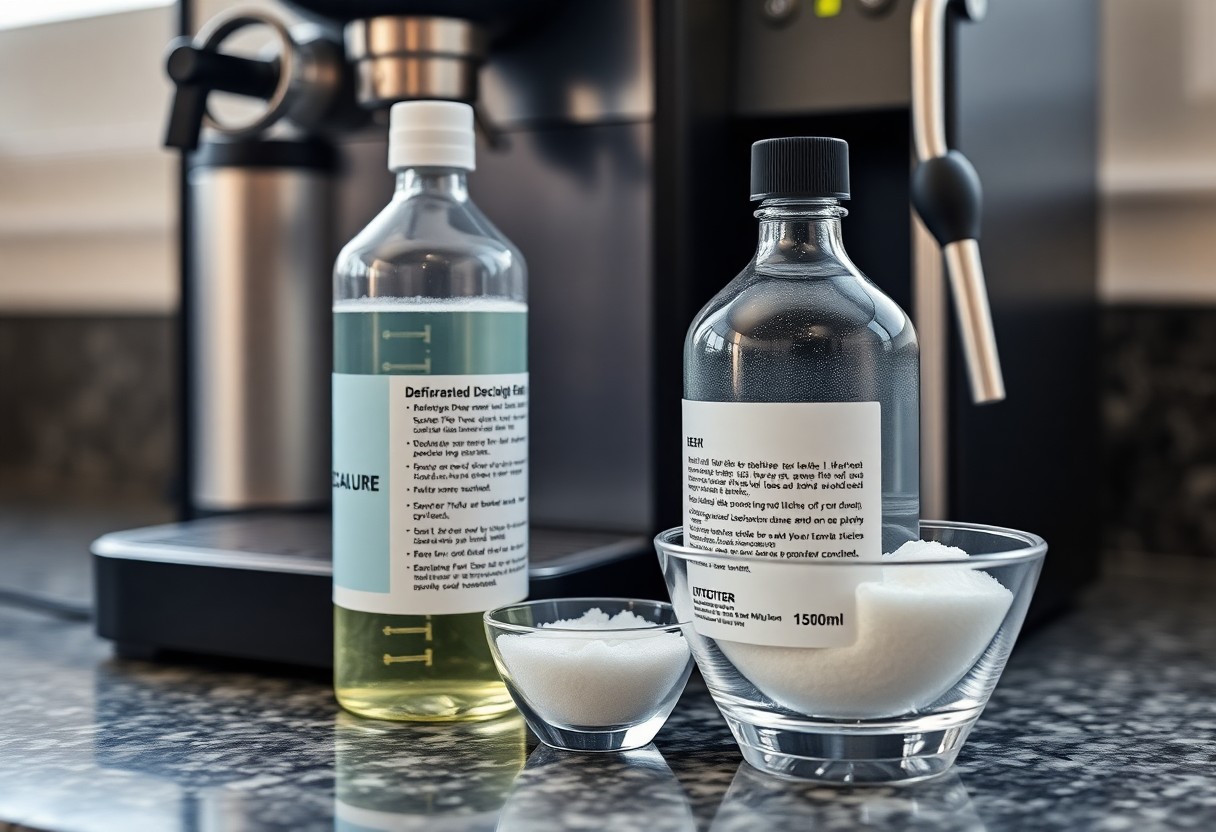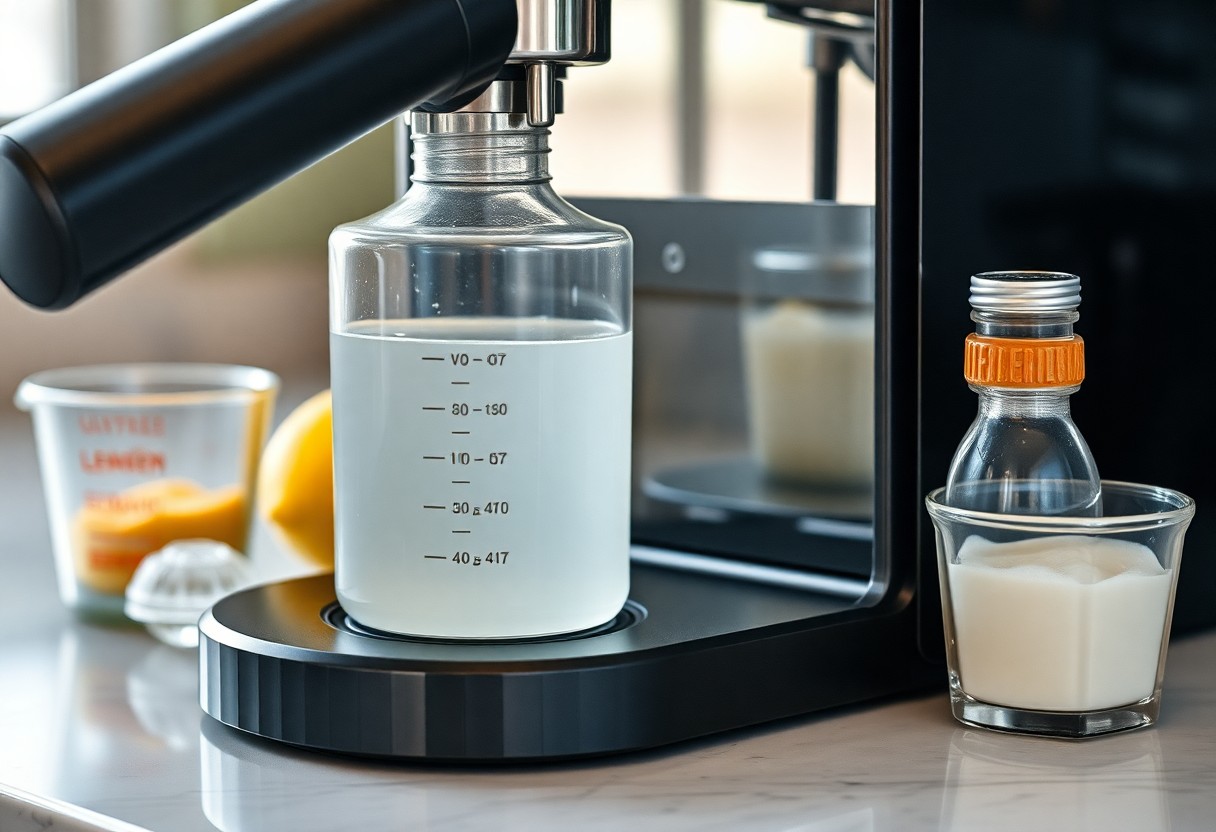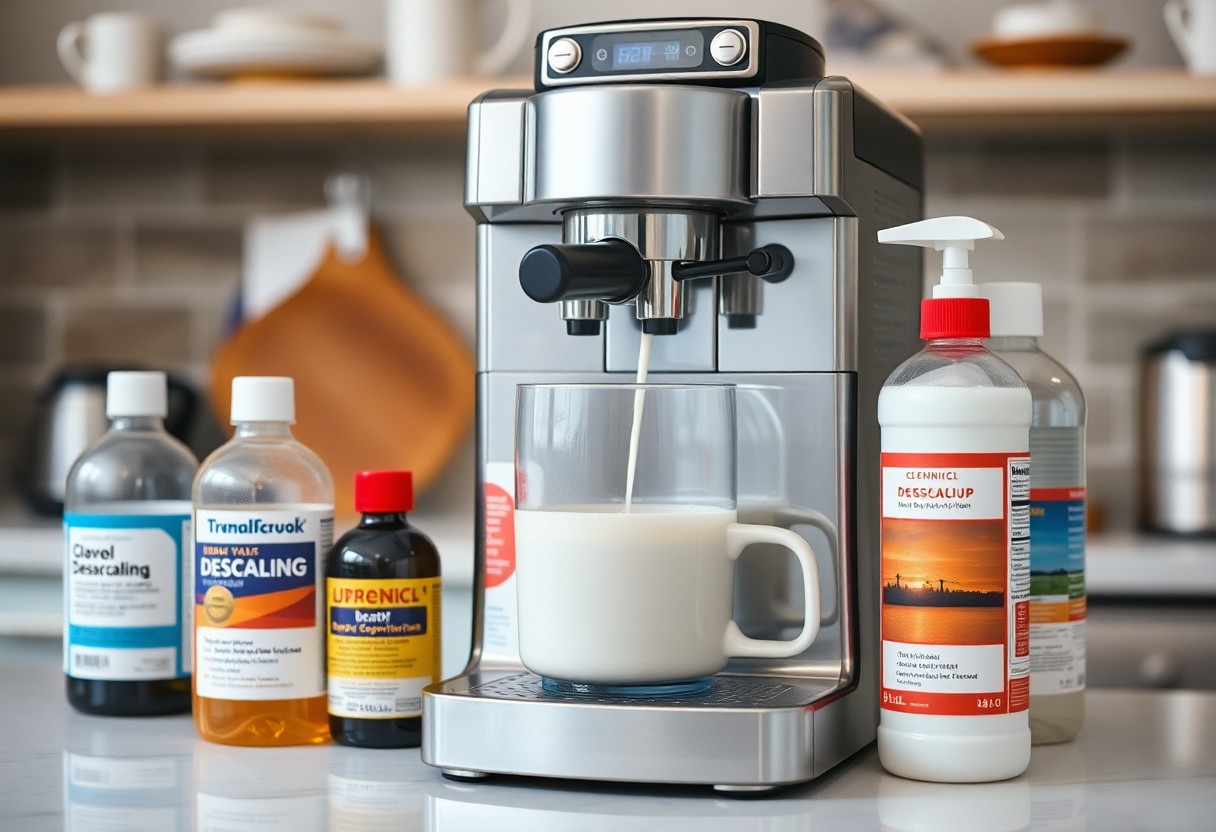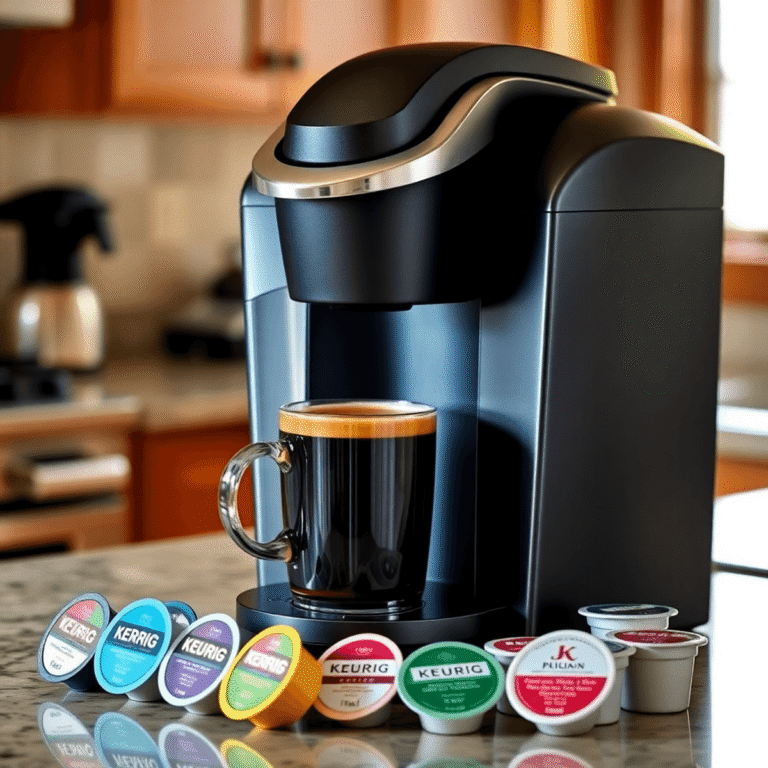What is Descaling Solution for Coffee Machine – Chemical Treatment
Many coffee enthusiasts may not realize the importance of using a descaling solution for your coffee machine. This chemical treatment effectively removes mineral buildup, which can affect the taste of your coffee and the performance of your machine. Regular descaling helps maintain your coffee maker’s efficiency, prolongs its lifespan, and ensures a consistently delightful brew. However, using the wrong type of solution can be harmful to your machine, so it’s vital to choose a product specifically designed for this purpose. In this post, we’ll explore what descaling solutions are and how to use them effectively.
Key Takeaways:
- Descaling solution is designed to remove mineral buildup, such as calcium and lime, from coffee machines, ensuring optimal performance and flavor.
- Regular descaling helps prolong the life of the coffee machine by preventing corrosion and maintaining its efficiency.
- Different coffee machines may require specific descaling solutions, so it is important to use a product recommended by the manufacturer.
- Descaling should be performed every 1-3 months, depending on water hardness and usage frequency, to maintain consistent brewing quality.
- The process usually involves diluting the solution in water, running it through the machine, and thoroughly rinsing to remove any residue.

The Science That Powers Descaling Solutions
Understanding the chemistry behind descaling solutions can enhance your approach to maintaining your coffee machine. These solutions typically rely on acids that effectively dissolve mineral deposits and build-up caused by hard water. Frequent usage of descaling treatments minimizes the potential for damage and maintains optimal functioning, ensuring you enjoy consistent coffee flavor and machine performance over time.
Key Ingredients and Their Functions
Commonly, descaling solutions consist of citric acid, tartaric acid, or acetic acid, each targeting limescale formation differently. Citric acid, sourced from citrus fruits, provides a natural alternative while effectively breaking down calcium and magnesium deposits. Tartaric acid, often found in wine, helps combat stubborn scale, while acetic acid, the primary component of vinegar, serves as a potent solvent for common mineral buildups.
How These Chemicals Interact with Lime Scale
The effectiveness of descaling solutions lies in their ability to break ionic bonds within limescale, a composite primarily made up of calcium carbonate. As the acid in the solution comes into contact with the scale, it ionizes and undergoes a chemical reaction, converting the solid deposits into soluble compounds. This process allows you to wash away limescale with water, restoring your coffee machine’s efficiency.
During the interaction with limescale, these acids effectively target and disrupt the bond between calcium ions and carbonate ions. For instance, in the case of citric acid, it reacts with calcium carbonate to form soluble calcium citrate, which can easily be flushed from your machine. This reaction not only disintegrates the harmful deposits but also helps in preventing future accumulations by keeping the surfaces clean and free of buildup. Ultimately, using these acids as part of your maintenance routine ensures your coffee machine operates at peak performance, delivering the flavorful brews you enjoy.
The Role of Descaling in Coffee Machine Maintenance
Effective maintenance of your coffee machine hinges on regular descaling, a process that eliminates mineral buildup that can compromise functionality. By routinely employing a descaling solution, you not only preserve the longevity of your machine but also ensure optimal brewing conditions. This routine habit enriches your coffee experience, yielding better flavor and aroma each time you brew.
The Impact of Scale Buildup on Performance
Scale buildup, primarily caused by hard water minerals, can severely hinder your coffee machine’s performance. Over time, scales restrict water flow, lead to uneven heating, and increase brew times, ultimately compromising the quality of your coffee. In some cases, you may even experience equipment malfunctions, which can result in costly repairs or replacements.
Long-Term Benefits of Regular Descaling
Committing to regular descaling not only preserves the functionality of your coffee machine but also promotes consistent taste in your brews. With reduced scale buildup, your machine operates efficiently, ensuring the perfect extraction of flavors every time. Furthermore, this maintenance habit can significantly prolong the lifespan of your equipment, saving you money and time in the long run.
Investing in a routine descaling regimen offers profound long-term benefits. Over time, regular maintenance minimizes the risk of serious breakdowns, as scale-related issues are addressed before they escalate. You’ll notice enhanced flavor extraction and a more reliable brewing process, leading to consistently rich coffee. Moreover, some manufacturers even stipulate that neglecting descaling could void warranties, highlighting the financial prudence of regular treatment. So, by establishing a productive descaling routine, you not only enjoy superior coffee but also protect your investment in quality equipment.
Demystifying the Descaling Process
The descaling process involves systematically removing mineral buildup from your coffee machine, ensuring optimal performance and taste. While it may seem complex, following a structured approach can simplify the task. Knowing the signs of scale, such as irregular water flow or bitter coffee flavors, can help you identify the right time for this crucial maintenance. With the right descaling solution and method in hand, you’ll be able to restore your machine’s efficiency and enhance your coffee experience.
Step-by-Step Guide to Descaling Your Coffee Machine
| Step | Description |
|---|---|
| 1 | Mix the descaling solution with water according to package instructions. |
| 2 | Pour the mixture into the water reservoir of your coffee machine. |
| 3 | Start the brewing cycle without coffee grounds to allow the solution to flow through. |
| 4 | Let the machine sit for the recommended time to dissolve the scale. |
| 5 | Run several cycles of clean water to rinse out the remaining solution. |
Common Mistakes to Avoid During Descaling
Errors during descaling can lead to inefficiency and damage to your coffee machine. Skipping the preparation steps, such as not reading the instructions of your descaling solution or neglecting to perform thorough rinsing afterward can significantly impact your machine’s longevity and performance. Using the incorrect type of solution, especially those not designed for your coffee maker, can also pose risks. Ensuring adherence to the guidelines provided by the manufacturer is vital for achieving the best results.
It’s easy to overlook simple aspects, such as failing to check the reservoir for residue or assuming that all descaling solutions are equivalent. Misunderstandings around the timing—either leaving the solution in too long or not long enough—can also lead to inadequate cleaning. For optimal outcomes, follow the specific recommendations for your machine. Always ensure you use a compatible descaling solution and focus on the consistency of your maintenance schedule, ideally descaling every three months if you use your coffee machine frequently.

Alternatives to Commercial Descaling Solutions
You might want to explore cheaper and environmentally friendly alternatives to commercial descalers. Common household items like white vinegar and citric acid can effectively combat mineral buildup in your coffee machine. For a detailed comparison of these alternatives, check out this guide on Cleaning a Coffee Pot: Vinegar vs. Descaling Solution.
Homemade Solutions: Effectiveness and Safety
Vinegar is one of the most popular homemade descaling agents, lauded for its ability to dissolve calcium deposits. However, using a solution that is too strong might lead to lingering tastes and odors, which can affect the flavor of your coffee. Always rinse thoroughly after descaling with homemade solutions to ensure your safety.
Comparing Costs and Environmental Impact
Commercial descalers can be expensive, costing anywhere from $10 to $20, while homemade solutions often involve items already in your pantry, significantly reducing costs. You can make a vinegar solution for just a couple of dollars. Additionally, homemade options are usually more eco-friendly, avoiding harsh chemicals found in many commercial products. Here’s a quick comparison:
Cost and Environmental Impact Comparison
| Solution Type | Approximate Cost ($) | Environmental Impact |
|————————-|————————–|———————————-|
| Commercial Descalers | 10 – 20 | Often contain chemicals harmful to the environment |
| Homemade (Vinegar/Citric Acid) | 1 – 3 | Generally eco-friendly and biodegradable |
When assessing your cleaning options, consider how your choice affects both your wallet and the planet. Using homemade solutions not only saves you money but also lessens the burden on the environment, making it a smart choice for the eco-conscious consumer.
Debunking Myths About Coffee Machine Care
A common misconception is that coffee machines operate perfectly without regular maintenance. Many believe that merely rinsing the parts is sufficient, neglecting the buildup of scale that can significantly affect performance and flavor. You’re not alone if you’ve heard that simply brewing vinegar will suffice for cleaning, but this often leads to internal damage. Understanding the reality of your coffee machine’s needs can enhance your brewing experience and prolong the lifespan of your equipment.
Misconceptions About Descaling Frequency
Some coffee enthusiasts think that descaling is only necessary when they notice signs of scale buildup. However, waiting for visible indications can be detrimental to your machine. Depending on your water hardness, it’s advisable to descale every three to six months. This proactive approach ensures that scale does not accumulate, maintaining performance over time and preventing costly repairs.
The Truth Behind Coffee Flavor and Scale
Many people assume that scale buildup doesn’t affect coffee taste, thinking it just a minor inconvenience. In reality, scale can obscure the rich flavors of your coffee, leading to a dull and lackluster brew. As scale forms, it alters water flow and temperature, leading to uneven extraction during brewing. This not only diminishes the vibrancy of your coffee’s flavor profile but may also lead to bitterness or sourness that masks the coffee’s natural characteristics.
When scale builds up in your machine, it interferes with the heating elements meant to brew your coffee at optimal temperatures. This can mean that your coffee isn’t being brewed evenly, which directly affects how the flavors are extracted. For example, too high a temperature may cause over-extraction while too low leads to under-extraction. Maintaining a regular descaling schedule can preserve both the taste of your coffee and the longevity of your machine.
To wrap up
Considering all points, descaling solution for your coffee machine is an vital chemical treatment that helps maintain optimal performance and flavor. Regular use of descaling agents removes mineral buildup, ensuring that your coffee tastes fresh and your machine operates efficiently. By incorporating this simple yet effective procedure into your routine, you can extend the life of your machine and enhance your daily coffee experience. Prioritize your coffee machine’s health by using a suitable descaling solution tailored to its specific needs.
FAQ
Q: What is a Descaling Solution for Coffee Machines?
A: A descaling solution is a chemical treatment specifically designed to remove mineral deposits, primarily calcium and lime scale, that accumulate inside coffee machines over time. These deposits can impact the machine’s performance, affecting water flow and the quality of the brew. Descaling solutions are formulated to dissolve these minerals, ensuring that your coffee machine operates effectively and prolonging its lifespan.
Q: How often should I descale my coffee machine?
A: The frequency of descaling your coffee machine depends on the hardness of your water and how often you use the machine. Generally, it’s recommended to descale every 1 to 3 months. If you notice slower brewing times or a change in the taste of your coffee, it may indicate that descaling is overdue. Following the manufacturer’s instructions can also guide you on the appropriate schedule for your specific model.
Q: How do you use descaling solution in a coffee machine?
A: To use a descaling solution, start by mixing the solution with water according to the instructions provided on the product label. Next, pour the mixture into the water reservoir of your coffee machine. Run a brewing cycle without coffee grounds to allow the solution to flow through the system. After the cycle is complete, rinse the reservoir thoroughly with fresh water and run a couple of additional cycles with clean water to ensure all residue is removed.
Q: Are there any natural alternatives to commercial descaling solutions?
A: Yes, there are natural alternatives to commercial descaling solutions. Common household ingredients like vinegar or citric acid can act as descalers. For a vinegar solution, mix equal parts vinegar and water, and for citric acid, mix about 2 tablespoons of citric acid with 1 liter of water. It is important to note that while natural alternatives can be effective, they may not be as powerful as commercial solutions and should be used carefully to avoid damaging your machine.
Q: Can descaling solutions damage my coffee machine?
A: When used according to the manufacturer’s instructions, descaling solutions should not harm your coffee machine. However, if used excessively or if a solution not specifically formulated for coffee machines is applied, it can cause damage. Always check the recommendations from your machine’s manufacturer and choose descaling products that are compatible with the material of your coffee machine to ensure safe usage.







